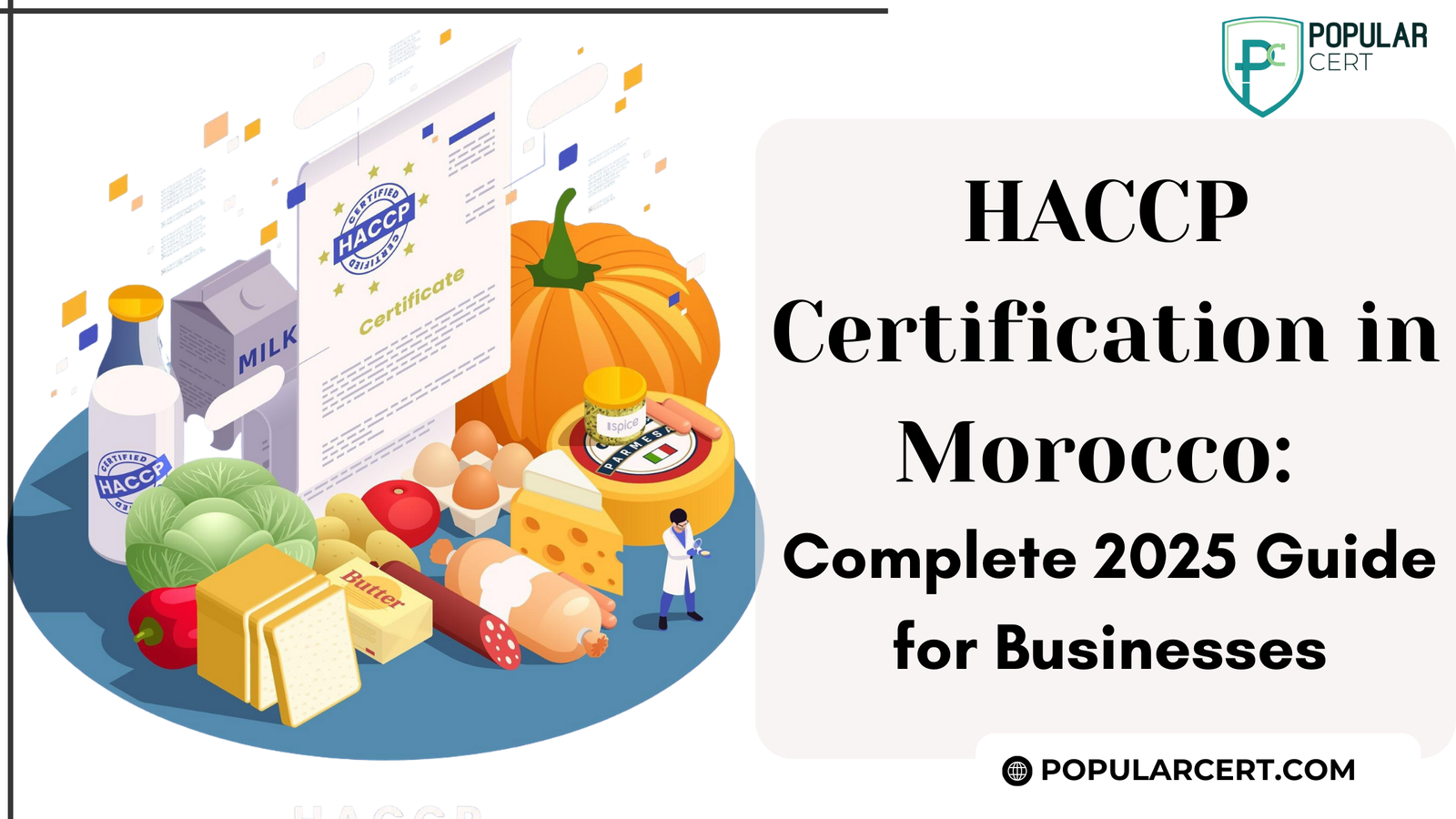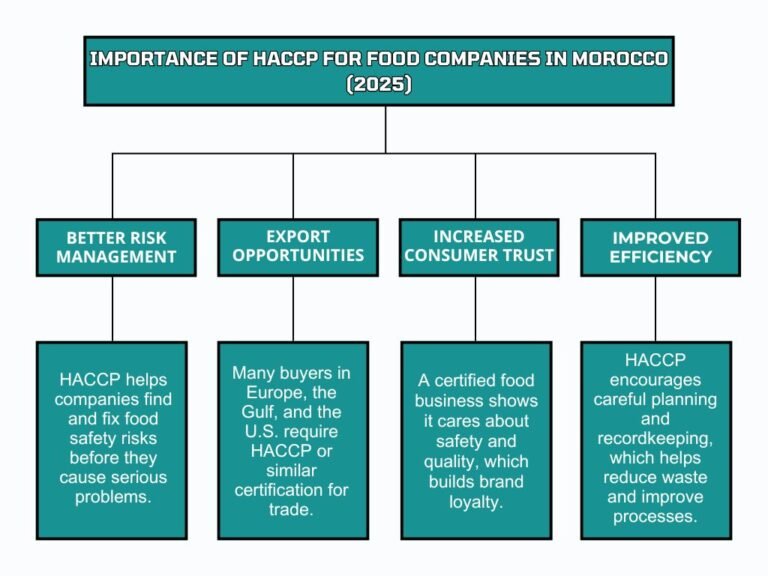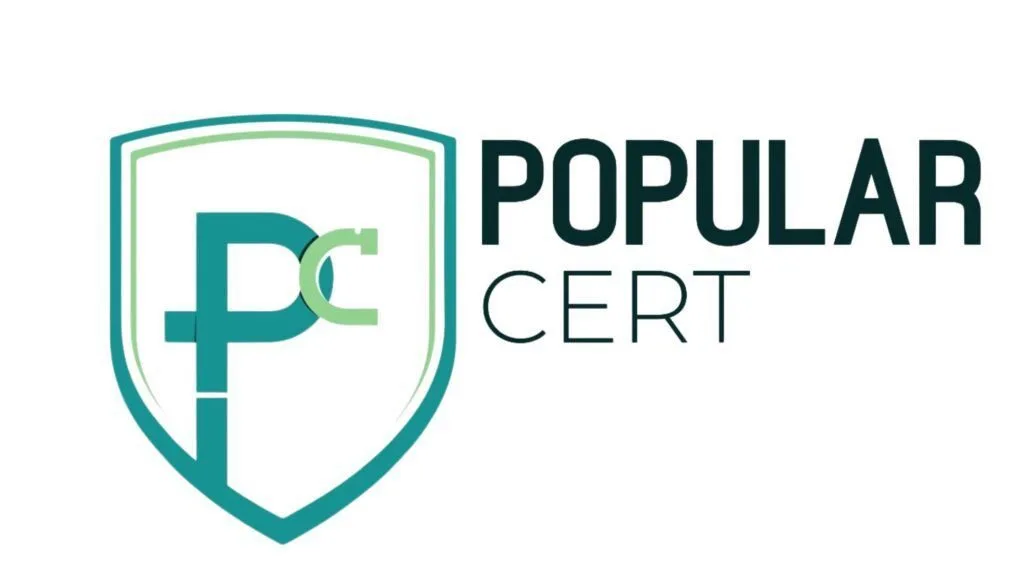HACCP Certification in Morocco: Complete 2025 Guide for Businesses

Introduction
Morocco’s food industry is growing fast, and food safety is more important than ever. It’s not just about following rules, it’s about gaining trust, staying competitive, and reaching more customers. From seafood companies in Agadir to street food vendors in Casablanca, everyone must provide clean, safe, and traceable food. To achieve this, many are turning to HACCP Certification in Morocco. HACCP (Hazard Analysis and Critical Control Points) helps businesses find and control food safety risks, ensuring their products are safe to eat. Today, HACCP certification is becoming the trusted standard for food safety across Morocco.
How HACCP Certification Keeps Food Safe?
HACCP Certification stands for Hazard Analysis and Critical Control Points. It is a system that helps food businesses find possible dangers in food, such as harmful bacteria, chemicals, or objects, and stop them before they reach the customer. Unlike old methods that find problems after they happen, HACCP works to prevent them from the start. It adds safety at every stage—from buying ingredients to storing the final product. In Morocco, HACCP is supported by ONSSA (the national food safety authority) and matches international food safety standards, helping businesses improve quality and meet global market demands.
Why Moroccan Food Businesses Are Turning to HACCP in 2025?
As Morocco’s food industry grows and connects more with the world, food safety isn’t just about following rules, it’s part of doing smart business whether you’re sending citrus to the Gulf, running a seafood factory in Agadir, or managing a restaurant in Marrakesh, more and more people expect you to have proper food safety certification.
| Factor | Impact | Reason | Explanation |
|---|---|---|---|
| Export Expansion | Moroccan olive oil, seafood, and citrus products are expanding into EU and Gulf markets that require HACCP-compliant production. | Export Requirements | International buyers demand certified food safety systems like HACCP for imported goods, especially in the EU, Gulf countries, and North America. |
| Tourism Recovery | As tourism bounces back, hotels and restaurants focus more on hygiene and food safety to regain tourist trust and meet expectations. | Tourism Industry Standards | With millions of tourists visiting Morocco annually, food service providers must meet high hygiene standards to protect public health and reputation. |
| Stricter Local Regulations | ONSSA has increased inspections, pushing more food businesses to adopt formal safety systems like HACCP. | Government Regulations | Moroccan food laws are aligning with international norms, and HACCP helps meet ONSSA and global compliance requirements. |
| Rising Consumer Awareness | Urban consumers prefer products with visible safety certifications such as HACCP. | Domestic Food Safety Needs | Growing public concern about hygiene and quality drives local producers to adopt safer practices, such as HACCP. |
| Retailer Requirements | Supermarkets and large retailers now require suppliers to follow certified safety standards, encouraging small producers to adopt HACCP. | Retailer Pressure | Large retail chains and food distributors require HACCP certification from their suppliers, setting higher food safety standards. |
| Growth of New Food Brands | New food businesses are investing in HACCP certification early to build trust, ensure quality, and access local and global markets. | Market Differentiation | Businesses use HACCP certification to stand out in a competitive market, showcasing a commitment to safety and quality. |
Top Sectors Using HACCP for Growth in Morocco
- Seafood: Morocco is a leading exporter of sardines and other fish. HACCP helps ensure proper hygiene, freezing, and packaging, protecting both quality and safety.
- Olive Oil and Spices: Producers rely on HACCP to avoid contamination during processing and bottling, helping them meet local and export standards.
- Canned and Packaged Foods: As more people choose ready-to-eat foods, HACCP ensures products stay safe and fresh for longer periods.
- Bakeries and Confectioneries: From small bakeries to large factories, HACCP supports cleanliness and allergen control at every step.
- Dairy Products: In milk and yogurt production, HACCP reduces the risk of spoilage and ensures safe, high-quality products for consumers.
- Meat and Poultry: HACCP standards help prevent contamination and spoilage in the processing and packaging of meat, ensuring safe consumption.
- Beverages: From juices to bottled water, HACCP ensures that beverage production is free from harmful contaminants and meets safety regulations.
The Importance of HACCP for Food Companies in Morocco (2025)
As Morocco expands its presence in both regional and international food markets, food safety has become more important than ever. HACCP certification plays a key role by offering several major advantages across the supply chain:
Types Of Certification
- ISO Certification
- ISO 9001 Certification
- ISO 14001 Certification
- ISO 45001 Certification
- ISO 22000 Certification
- ISO 27001 Certification
- ISO 17025 Certification
- ISO 13485 Certification
- ISO 20000-1 Certification
- ISO 22301 Certification
- ISO 50001 Certification
- ISO 37001 Certification
- IATF 16949 Certification
- ISO 29001 Certification
- ISO 31000 Certification
- ISO 20121 Certification
- ISO 10002 Certification
- ISO 41001 Certification
Get Free Consultation
Our Clients



















HACCP Internal Audit Checklist
Common Challenges Moroccan Businesses Face
| Problem | What Happens | How It’s Being Solved |
|---|---|---|
| Lack of Understanding | Small food businesses don’t fully understand what HACCP means. | ONSSA and experts like PopularCert give simple training sessions. |
| Costs Feel Too High | Many companies think HACCP is too expensive to start. | Government support and low-cost plans make it easier to manage. |
| Too Much Paperwork | Staff are not used to filling forms or keeping records. | Easy templates and mobile apps help make the process simple. |
| Don’t Like Change | Teams want to stick to old ways of doing things. | Step-by-step training helps workers adjust to new rules. |
| Rules Seem Complex | New food safety rules can be confusing to follow. | Local consultants explain the rules clearly and offer full support. |
Success Stories from Moroccan Food Companies
- Agadir Seafood Processor Adopts HACCP: A mid-sized seafood packaging company in Agadir implemented HACCP with PopularCert’s guidance. Initially skeptical about documentation, they soon saw fewer rejections at EU borders and now use HACCP as a selling point in trade fairs.
- Casablanca-based Juice Manufacturer: After failing a health inspection in 2023, this business chose to adopt HACCP in 2024. With structured controls in place, they’ve avoided repeat violations, improved shelf life, and reduced wastage by 18%.
- Family-Owned Bakery in Fes: A traditional bakery embraced HACCP using a simplified approach supported by ONSSA guidelines. The owner reports improved customer trust and has started supplying to a supermarket chain.
How Moroccan Businesses Are Adapting to HACCP in 2025?
| Business Type | Approach to HACCP |
|---|---|
| Seafood Exporter in Agadir | Partnered with a HACCP consultant to map hazards and develop a traceability system. Uses QR codes to track fish from boat to buyer, ensuring full transparency and traceability. |
| Date Processor in Erfoud | Implemented controlled cleaning procedures and invested in stainless-steel processing lines. The improved hygiene standards helped secure new clients from the Gulf region. |
| Restaurant Group in Casablanca | Trained kitchen staff in HACCP basics and introduced temperature logs. Routine internal audits reduced customer complaints by 60%. |
| Olive Oil Cooperative in Meknes | Worked with an NGO to develop a HACCP plan. Affordable training enabled them to pass their first audit, enhancing their food safety credibility. |
HACCP for Small Businesses: Not Just for Big Companies
In Morocco, many people think that only large factories or export businesses need HACCP. However, small food vendors and local producers can benefit the most from it.
For example, a bakery in Rabat that introduced basic HACCP practices experienced:
- Fewer issues with product quality
- Improved hygiene practices among staff
- Better handling and separation of allergens
HACCP and the Future of Morocco’s Food Industry
- Morocco’s food industry is growing fast. With new global standards, stronger food safety rules, and higher expectations from customers, companies that follow HACCP will be ready for long-term success.
- As trade with countries like those in the EU and the Gulf region (GCC) grows, Moroccan businesses with HACCP certification will have a better chance to lead in food safety and win more Contracts.
- The future of Morocco’s food sector depends on trust. People want food that is safe and produced in a clean, careful way. Getting HACCP certified isn’t just about following rules; it’s a smart step toward growing your business for the future.
Why Moroccan Businesses Choose PopularCert for HACCP?
Moroccan businesses choose PopularCert for HACCP certification because:
- Expert Guidance: We provide step-by-step support through the entire certification process.
- Local Expertise: Our team understands the Moroccan market and offers tailored solutions.
- Training: We ensure staff are well-equipped with the knowledge to implement HACCP standards.
- Customer Support: Our ongoing assistance helps businesses maintain compliance.
- International Recognition: Our certifications are globally accepted, boosting market presence and trust.
PopularCert is the trusted partner for businesses aiming to improve food safety and meet industry standards.
HACCP for Every Moroccan Business
- In Morocco, food is an important part of the culture, economy, and trade with other countries. Getting HACCP certification isn’t just about following rules—it helps build trust with customers. Whether you make jam in Fes or export frozen food from Casablanca, starting your HACCP journey in 2025 can improve your business and support food safety across the country.
- At PopularCert, we’re here to help you every step of the way. With clear guidance, local knowledge, and full support, we’ll work together to create a safer and stronger food industry in Morocco.
GET A FREE CONSULTATION NOW
FAQ
Why are more Moroccan food businesses choosing HACCP in 2025?
In 2025, Moroccan food companies, from seafood exporters to local restaurants, are embracing HACCP to meet rising demands from international markets, stricter government inspections, and consumer expectations for clean, safe food. Certification helps them compete and grow both locally and globally.
What kind of impact does HACCP certification have on Moroccan food brands?
HACCP gives Moroccan food brands a major credibility boost. It builds consumer trust, opens up export opportunities, and helps meet requirements from retailers and tourism-linked businesses. Even new brands are using HACCP early to stand out and prove their commitment to safety.
Is HACCP certification really necessary for food businesses in Morocco?
Yes, especially in 2025. With Morocco’s food exports growing and local regulations becoming stricter, HACCP has moved from being optional to almost essential. It’s not just about paperwork—it’s about protecting your brand, your customers, and your business future.
Can small food businesses in Morocco afford to get HACCP certification?
Yes, it’s getting easier. Support from NGOs and the government is helping small businesses get HACCP certification. With low-cost help and training, even small food makers can improve safety and attract more customers.
